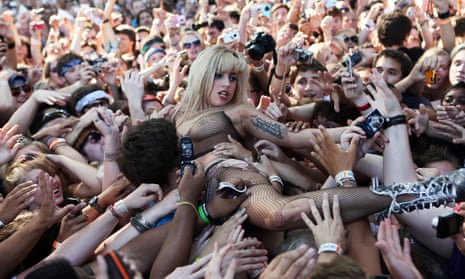I remember the exact moment my stage-diving career came to an end. I was backstage watching my favorite band, Eyehategod, tear up a Baltimore club, and heard the opening notes to my favorite song ring out across the venue. Joyfully, I ran and hurled myself off the front of the stage, suspended in midair and aiming for the roiling mass of shoulders and arms below – but then I overshot my leap, the back of my skull bounced off the unyielding concrete, and I made a (foggy) decision right then that my stage-diving days were over.
That day’s vicious headache could have been far worse, and I knew that if it had been, it would have been entirely my fault. When a person decides to hop onstage and invade the performers’ personal space, it’s generally not appreciated by musicians, and puts security staff in an unenviable position.
In the past week, we’ve seen headlines over rappers Action Bronson and Riff Raff, who have had fans barge onstage during performances and be either tossed off the side by Action himself (who seems to have a history of good-naturedly tussling with would-be stagedivers) – or squashed like a bug, in the case of Riff Raff’s security guard versus a fan. Catapulting yourself off a stage with clear intent is quite a lot different from being tossed willy-nilly by an angry man who’s much bigger than you. The latter encounter seemed like a blatant overreaction, but in the guard’s defense, he didn’t know who that man was or what his intention was.
Bear in mind that just last week, an unidentified man ran onstage during a Run The Jewels performance at SXSW and attempted to assault El-P. I remember Kirk Windstein of Crowbar roaring rhetorically at one stage invader “Do I go into your office and fuck your computer up? No, I don’t, because I respect you!” at a festival several years ago after a fan climbed onstage and things turned ugly. Windstein’s reaction to his own stage intruder may seem extreme, until one considers that his close friend, legendary Pantera guitarist Darrell “Dimebag” Abbott, was shot to death onstage by an unstable fan in 2004.
It’s an artist’s right to feel safe and respected onstage while he or she works; it is not any fan’s right to get up there and take over that space. It’s not like the practice is uncommon; it’s been a staple of punk rock, heavy metal, and rock’n’roll shows for decades, and really gained popularity during the 80s thanks to high-energy hardcore and thrash metal gigs. The past few years in particular have netted the practice a deluge of bad publicity, though, as an unfortunate number of stage dives and other stage invasions have gone terribly wrong.
In 2010, Lamb of God vocalist Randall Blythe spent months in a Czech jail on manslaughter charges after he pushed a fan offstage during a performance during which stage-diving was prohibited; the fan, Daniel Nosek, later died, and Blythe has spoken publicly about the need for safer show behavior. In 2014, Alberto Scott attended a Miss May I show in New York City and died after leaping off the stage; a fan at a Suicidal Tendencies show in Switzerland died the same way. That same year, a woman sued the band Fishbone for over a million dollars after its frontman dived on to her head, causing her serious injury.
Many artists from all across the genre spectrum have spoken out against the problem, from Blythe to Fugazi’s Ian McKaye to At The Drive In’s Cedric Bixler-Zavala and pop punks Joyce Manor, who came under fire recently for speaking out against stage-diving at one of their shows. Against Me! frontwoman Laura Jane Grace wrote an impassioned response to Noisey’s artist poll on the subject, stating:
“If someone jumps up onstage and comes at me trying to grab my head and plant a kiss on my lips, I should have the right to instead smash them in the face with my guitar headstock. An audience member should have the right to defend themselves against crowdsurfers. If someone is imposing their body on to someone else, then that person should have the right to impose their body on to them.”
The bottom line? Respect and communication is key. Music fans, we know you’re excited and fired up and having fun (that’s what live music is about) but please, try not to be an ass. Unless the crowd is explicitly invited or encouraged to do so, you have no business charging onstage while a band of strangers is performing. If you decide to do it anyway, look before you leap, and acknowledge that the consequences could be unpleasant – or even deadly. You’re playing with fire, and you might get burned, or worse, land on someone else who’s smaller or less strong than you are. I learned my lesson years ago, and it might be time for you to learn yours – though hopefully with a little less blood.

Comments (…)
Sign in or create your Guardian account to join the discussion